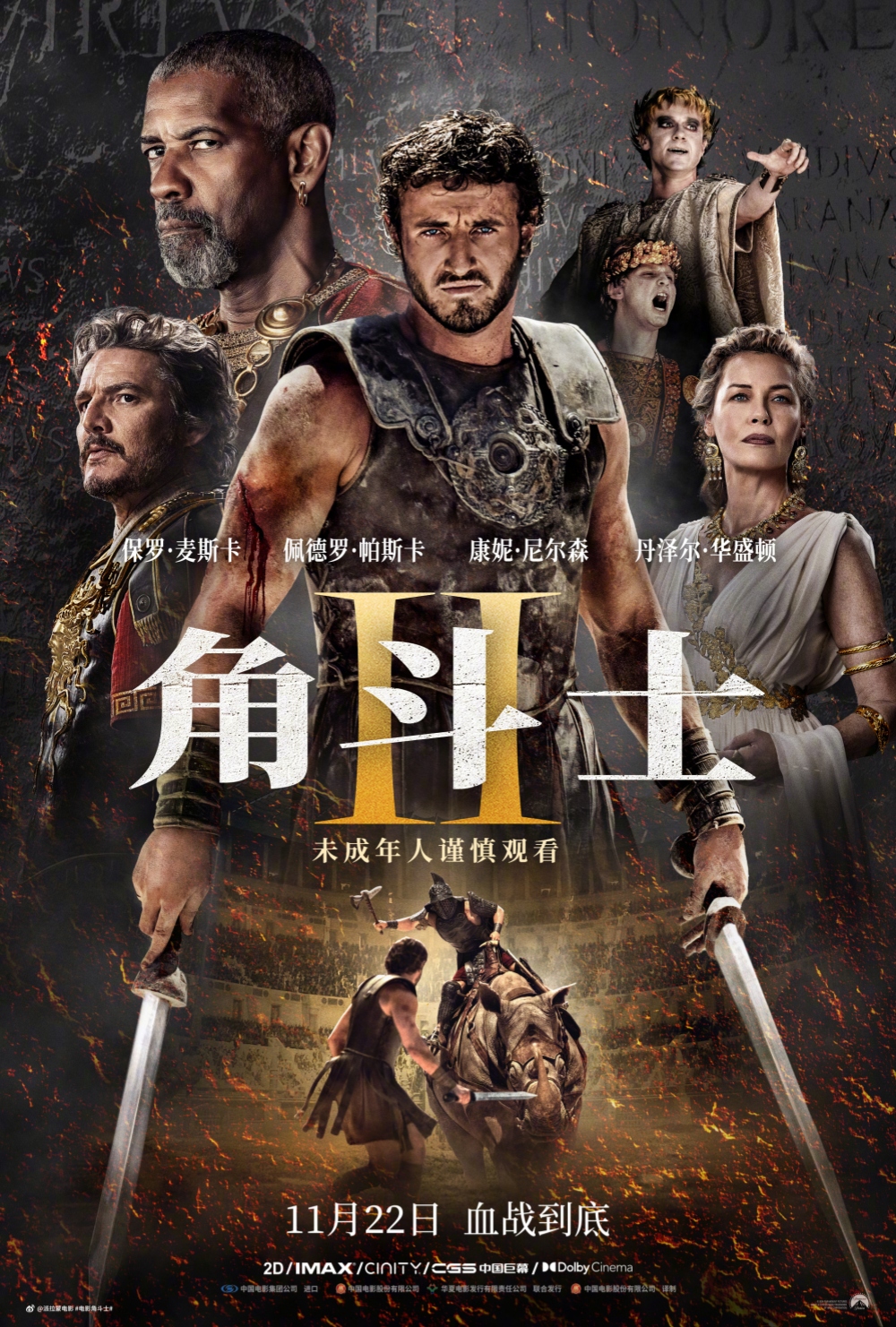
In about two weeks, the highly anticipated epic film Gladiator II will begin its release in theaters worldwide, including North America and China. This sequel to the Oscar-winning film Gladiator, released in 2000, is once again directed by Ridley Scott and set in the era of the Roman Empire. The cast has changed, featuring Paul Mescal, Pedro Pascal, and Denzel Washington, among others.

Gladiator II poster
Previously, the initial group of media representatives who were invited by Paramount Pictures to view the film provided positive feedback on social media. They praised Ridley Scott's directing skills, as well as the film's production design and action sequences. Lead actors Paul Mescal and Denzel Washington also received much acclaim. Overall, the film is perceived to be well above average, even having the potential to achieve accolades during this award season.
However, last week, a historian publicly criticized the plot of Gladiator II as absurd and nonsensical, sparking considerable discussion on social media. Some argued that Hollywood films are inherently dramatized and as long as the story is engaging, historical inaccuracies can be overlooked. Others felt that since the characters, locations, and stories in the Gladiator series are based on genuine historical events, they should strive to remain as close to historical reality as possible. Ultimately, this debate has brought a significant amount of attention and visibility to the upcoming film.
Currently, media outlets generally predict that Gladiator II will achieve a North American box office opening of at least $50 million, which may not match the same-period release of Disney’s new film Wicked. It’s worth noting that the production cost of Gladiator II is rumored to be as high as $300 million, making it the largest investment for a film in 2024, putting substantial pressure on Paramount.
Returning to the criticisms regarding historical inaccuracies, the voice behind these claims is Shadi Bartsch, a professor of classics at the University of Chicago, born in 1966. Over the past decades, she has specialized in topics such as ancient Roman history, literature, and philosophy. Although she, like the vast majority, has yet to see the complete film of Gladiator II, after watching preliminary trailers online, she found the content to be quite absurd, prompting her to feel it necessary to speak out.

Gladiator II still
The story of Gladiator II takes place twenty years after the original film, focusing on Lucius, the son of Maximus, played by Russell Crowe, as portrayed by Paul Mescal. At this time in the Roman Empire, during the co-reign of the brothers Caracalla and Geta, Lucius, under the tutelage of a teacher played by Denzel Washington, follows in his father's footsteps and embarks on the path of a gladiator, vowing to overthrow the cruel reign of the brother emperors.
In the trailer, there is a scene depicting a Roman coliseum completely submerged in water, with sharks swimming inside it. Professor Shadi Bartsch scoffed at this, stating that while the Romans did flood the coliseum for training soldiers for naval battles, "I don’t think Romans knew what sharks were." Additionally, regarding the image of a rhinoceros charging into the coliseum, she pointed out that ancient Roman poetry does mention the animal, but at that time, everyone only encountered the single-horned rhinoceros, not the double-horned version shown in the film's trailer.

Gladiator II still
A third noted historical inaccuracy was described as particularly absurd: in the trailer, there is a scene of Romans sitting in a café reading newspapers. In Bartsch's view, this is a critical error, as printed newspapers did not emerge until around 1200 years later. She noted that at that time, Romans did have their own news medium known as the famous Acta Diurna (translated as The Daily Records), which was the official government gazette of the Roman Empire and the world's earliest regularly written news report. However, it was not written on paper but carved into stone or metal and displayed in designated areas. "So you would have to go there to read it; there were no cafés back then," Bartsch criticized.
This is not the first time Ridley Scott's films have faced denial from historians. The previous Gladiator received five Academy Awards, including Best Picture, but also drew substantial criticism from historians. Even several expert consultants originally hired for the crew eventually exited, exposing various historical inaccuracies in the film, such as incorrect armor worn by soldiers, and that stirrups for cavalry had yet to be invented during that period.

In the first Gladiator, the armor worn by soldiers was criticized for historical inaccuracies.
More recent examples include the film Napoleon, released last year. This film also faced significant critiques from authoritative historians, though director Scott seemed quite indifferent to the feedback, humorously stating during interviews, "Whenever I argue with historians, I ask, ‘Friend, excuse me, but were you there at the time? Did you see it with your own eyes? If not, then shut your filthy mouth.’" It appears that in response to the external criticisms of Gladiator II, Scott, affectionately nicknamed "the Thunder God" by Chinese netizens, may indeed unleash similar harsh remarks.

Scott's earlier film Napoleon faced multiple historical inaccuracies.


